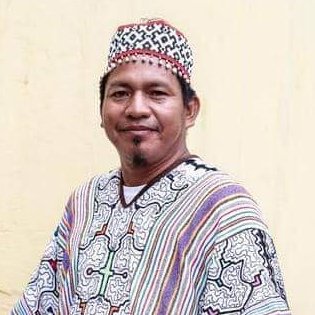HRD Interview: Miguel Guimaraes, President of the Federation for Ucayali and Afluentes Native Communities (FECONAU), Peru

Miguel Guimaraes
Hi Miguel! Please tell us about yourself, your community and your work. What do you defend and in what way?
Miguel: I am Miguel Guimaraes from the Shipibo-Konibo Indigenous people, from the Flor de Ucayali community in the Peruvian Amazon. My name in Shipibo is Ranin Xeka. I am a defender of collective rights, forests and territories, and at the same time I am the President of the Federation of Native Communities of Ucayali and Affluents (FECONAU). I work with 30 communities within three groups of Indigenous peoples of the Amazon. Because of the work I do on behalf of my people, I am under threat of being silences and even killed, but I continue to fight for my people, defending what for us is our life. We have a spiritual relationship with nature. That’s extremely important for us, since our future generations depend on it. Since I was young, I have always fought for my people, and will continue to do so until the end.
You have raised concerns about the human rights and environmental impact of a particular palm oil company. How has the company affected the rights of your community?
Miguel: I have been denouncing the actions of the Peruvian state, which persists in applying public policies that encourage the promotion and expansion of agribusiness in the Peruvian Amazon, particularly oil palm monoculture plantations. In complicity with a palm oil company, the government has destroyed and dispossessed our territories where we have lived for millennia.
Have the company's buyers engaged with you or tried to understand the situation? Have they taken any steps to improve it?
Miguel: The company has not respected the collective rights of the community of Santa Clara de Uchunya, a community that lives under constant threat from the company's workers. It has polluted our waters, destroyed our resources, our animals have been burned alive, and until now we remain with no justice.
Recently, attacks against your community leaders have worsened. Can you tell us more about what happened? Do you think these attacks are in retaliation for your work?
Miguel: As human rights defenders, we have received threats not only in words. In some cases, we have been persecuted and threatened with weapons in front of our face, despite the complaints we make.
Authorities do not take that into account, and this makes our situation more difficult. They are indifferent to the hard situation we have to face, having to change house every week to escape being killed.Miguel Guimaraes
There are drug traffickers who operate in the area and are trying to take over your land. How does this affect your security situation?
Miguel: Illegal activities, such as drug trafficking, are invading our territories and because of the complaints we make to the authorities we are being persecuted, threatened, in some cases assassinated - for the sole reason of defending our forests, which is our only source of livelihood. Flor de Ucayali, Santa Clara de Uchunya and other communities continue to be threatened by drug traffickers and illegal loggers. We are prisoners in our own territory. We cannot walk freely; we live in a very difficult situation.
You have undertaken a collective protection of your territory and your people: can you tell us how this collective protection works?
Miguel: Despite this difficult situation, we collectively monitor our territories, we patrol the area, we demarcate boundaries, we plant organic agriculture, we organise an Indigenous guard at night, and we use our ancestral knowledge so that ill-intentioned people cannot invade the area. We use the piripiri and the ayawaska, medicinal plants which keep enemies away.

You have recently started a campaign to build a “maloka”, a traditional space to reach agreements, which would be guarded with police protection, and would offer internet access and a safe space for training and advocacy work: can you tell us about this campaign, why is it important and why should our audience support it?
Miguel: The campaign’s goal is to raise funds to build a maloka that will serve as a refuge to guarantee the protection and safety of frontline defenders and leaders, who face dangers every day. We want to build a safe environment to continue our advocacy work, to achieve territorial protection and access to justice.
You are working closely with other indigenous communities in Peru and with other organizations around the world: What is the vision of the future of FECONAU? How would you like the world to change?
Miguel: We work in an integrated way, and we represent an organic structure of the Indigenous movement. We work as a local base with the Federation of Native Communities of Ucayali (FECONAU), affiliated to our regional organization, the Inter-Ethnic Development Association of Ucayali (AIDESEP-UCAYALI), which in turn is affiliated to the national AIDESEP. AIDESEP is affiliated to the Coordination of Indigenous Organizations of the Amazon Basin (COICA). We want a more just society, without discrimination, and with respect for nature.
Protect the Guardians of the Amazon: A Refuge for Indigenous Defenders
The Federation of Native Communities of the Ucayali River (FECONAU) is one of the oldest federations in the Peruvian Amazon and represents more than 30 communities belonging to the Shipibo-Konibo, Asháninka, Isconahua and Awajúm indigenous peoples. FECONAU protects the rights of these people and their ancestral territories, as they fight every day trying to contain illegal extractive activities such as drug trafficking, illegal logging and the invasion of lands. FECONAU has started a campaign to raise 150,000 Peruvian soles (approximately 36,400 USD) to build a “Maloka”, a refuge where Indigenous leaders can feel protected and be trained, so that they can continue with their work without fear of retaliation.